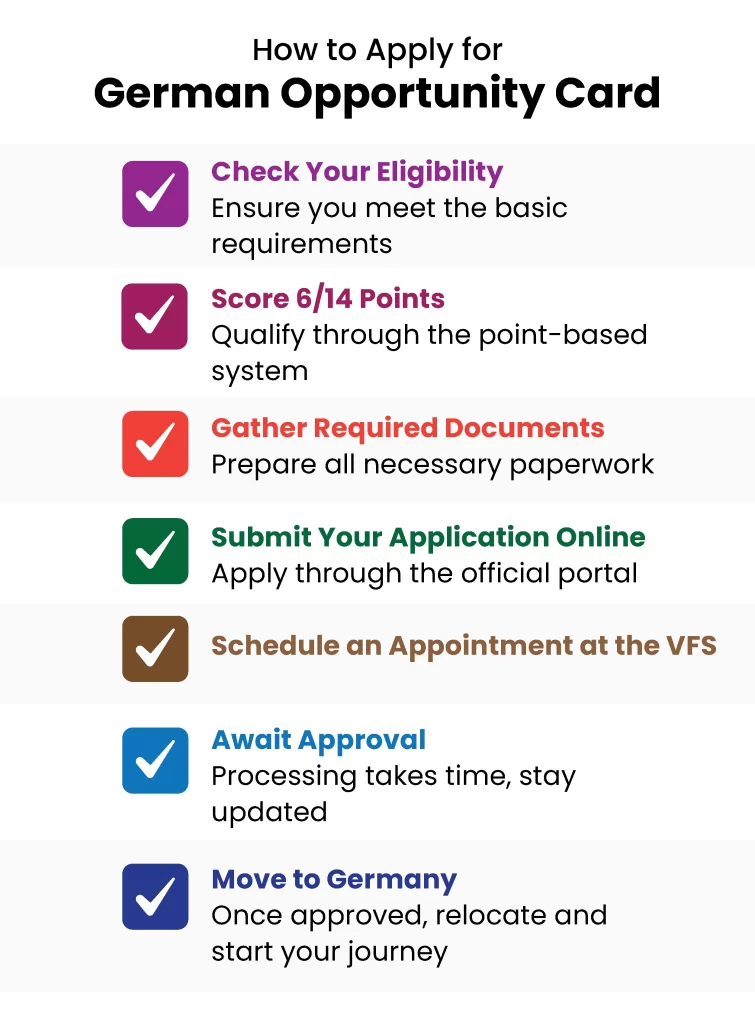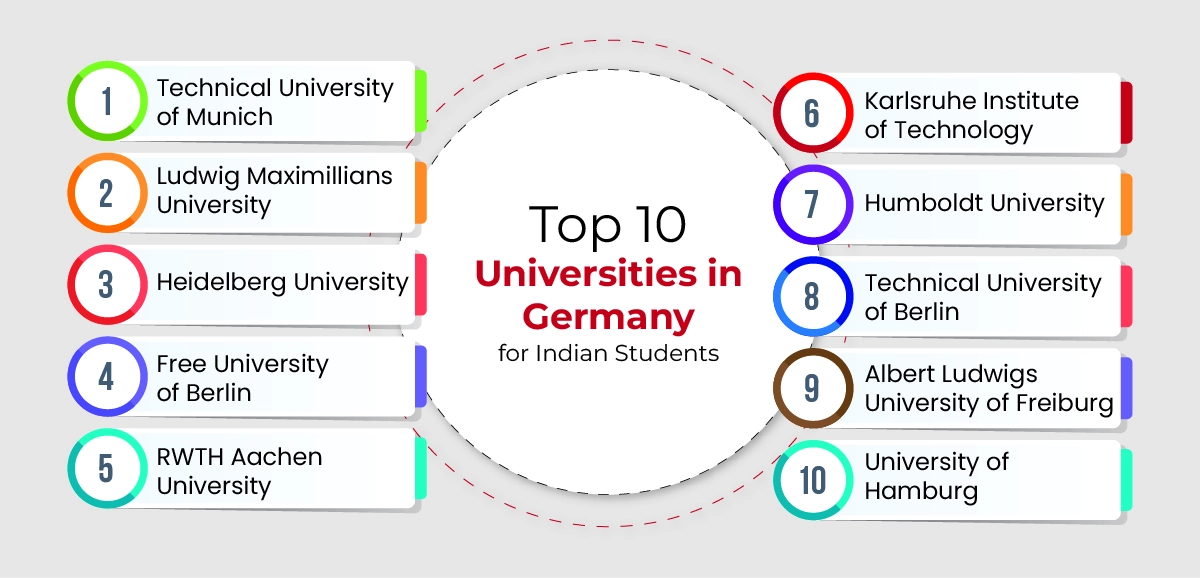So, is Germany on your wishlist? You are at the right place! As a skilled worker looking to live and work in Germany, the German opportunity card also known as the Chancenkarte visa is the best option for you. Because you can job hunt upon arrival without a job offer in advance and earn through part-time jobs. It’s truly a blessing when your dream destination is Germany. Without any delay, Let’s get into how you can apply for German opportunity card.
Table of Content
1How to Apply for German Opportunity Card2Opportunity Card Requirements3What is the Point Based System for Immigration in Germany4Germany Opportunity Card Points Calculator5Opportunity Card Germany Cost6Frequently Asked Questions
How to Apply for German Opportunity Card

Here we can look into the step-by-step process of how to apply for the German opportunity card.
1. Check your Eligibility
As the first step to go for the opportunity card, you need to check your eligibility. Whether you can apply for it or not. Your education qualification, age, language skills, sufficient financial resources, and some other factors you need to meet according to the criteria.
A recognised degree or at least 2 years of vocational training, 18-40 years of age, either English or German language proficiency, also you have to prove you can financially support yourself throughout the visa period. There is a point distribution system also you have to take care of, we can discuss everything in detail later.
2. Evaluate your Points
If your educational qualification is only partially recognised in Germany then you have to score a point of 6 out of 14 according to the point distribution table. Which is affected by how much you can meet the Chancenkarte requirements.
3. Compile all the Documents
The documents needed for the application, compile all of that. It starts from your valid passport to a curriculum vitae.
4. Upload Documents Online
Applicants can conveniently upload their required documents online. Once the verification process is completed by the embassy, then you can schedule an appointment at the VFS (Visa Facilitation Services) centre to continue with the application process.
5. Wait for Approval
Once you have submitted your application and completed the necessary verification steps, the next step is waiting for approval. The processing time may vary depending on the embassy’s workload and individual application details. During this period, it’s important to regularly check for updates and ensure you are prepared for the next steps once your application is approved.
6. On Approval, move to Germany
To apply for German opportunity card The last big important step is moving to Germany!
Prepare for your journey by familiarizing yourself with the essentials of living and working in Germany. With your opportunity card in hand, you can now explore job opportunities and settle into your new life with confidence.
Opportunity Card Requirements
Understanding the opportunity card requirements will help ensure a smooth application process and increase your chances of approval. Let’s break down the key eligibility factors you need to fulfill.
Eligibility Criteria
These are the main specific conditions you need to meet to apply for opportunity card
Qualification: You must have completed a minimum of two years of vocational training or possess a university degree that is recognised both in the country of issuance and in Germany.
Language proficiency: You must have at least A1-level proficiency in German or B2-level proficiency in English.
Sufficient financial resources: You must have sufficient financial means to support yourself during your job search in Germany. This can be demonstrated through a blocked account with a minimum balance of EUR 1,091 per month as of 2025.
Points: If your qualification is only partially recognised in Germany you have to check the score according to the point distribution table. And you have to score 6 points out of 14 to apply for German opportunity card.
Documents Required
Now we can look what are the documents required to apply for German opportunity card, here is the checklist
1. Valid passport
2. Evidence of your residence
3. Proof of financial backing
4. Proof of vocational or academic credentials
5. Proof of accommodation in Germany
6. Proof of health insurance
7. Proof of acknowledgement of your qualifications
8. Proof of language proficiency
9. A signed state of purpose or motivational letter
10. Curriculum vitae
What is the Point Based System for Immigration in Germany
So this point-based system is only applicable when your non-academic vocational or academic qualification is not fully recognized in Germany. Then according to some criteria, you have to score a minimum of points in order to attain an opportunity card. The factors affecting this include
- Educational qualification
- Age
- Language skills
- Work experience
- Previous stay in Germany
- Spouse eligible for opportunity card
Every score has a maximum score and your score will be based on how much you can meet those criteria.
Germany Opportunity Card Points Calculator
It is designed to help you determine whether you meet the eligibility requirements to apply for the opportunity card.
You have to score at least 6 out of 14 points according to the system to apply for German opportunity card.
Factors Assessed in Point Based System and Maximum Points
| Factors assessed | Maximum points |
| Education qualification | 4 |
| Age | 2 |
| Language proficiency | 3 |
| Experience | 3 |
| Previous connection with Germany | 1 |
| Spouse is eligible for opportunity card | 1 |
| Total points | 14 |
To understand how much you can score from this a detailed analysis of the factors is needed, let’s get into that
1. Educational Qualification
| Description | Points |
|---|---|
| Partial recognition of a foreign educational qualification | 4 |
| Qualification from the shortage occupation list | 1 |
2. Age
| Description | Points |
|---|---|
| Under age 35 | 2 |
| Between age of 35 and 40 | 1 |
3. Language skills
| Description | Points |
|---|---|
| German language proficiency A2 | 1 |
| German language proficiency B1 | 2 |
| German language proficiency B2 | 3 |
| English language proficiency at least C1 | 1 |
4. Experience
| Description | Points |
|---|---|
| You have a work experience of 2 years in your field | 2 |
| You have a work experience of 5 years in your field | 3 |
5. Previous Connection with Germany
| Description | Points |
|---|---|
| You have stayed continuously for 6 months in Germany to study or work (tourism and visiting people don’t count) | 1 |
6. Spouse Eligible for Opportunity Card
| Description | Points |
|---|---|
| You are planning to come with your spouse who can also qualify for opportunity card | 1 |
Opportunity Card Germany Cost
Opportunity Card Germany now has an application fee of €75. Payment can be made in your local currency at the applicable exchange rate and can apply for German opportunity card.



